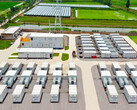The US government's Energy Department will be sponsoring the advancement of sodium-ion batteries' energy density to that of the next cheapest to produce, LFP cell chemistry that goes into power banks and EVs alike.
It is granting $50 million for sodium-ion battery research to the so-called Low-cost Earth-abundant Na-ion Storage (LENS) consortium led by Department of Energy’s Argonne National Laboratory.
The LENS sodium-ion battery research undertaking includes the Brookhaven, Lawrence Berkeley, Pacific Northwest, Sandia, SLAC National Accelerator laboratories, too.
According to the LENS consortium director, the goal is "improving sodium-ion energy density so that it first matches and then exceeds that of phosphate-based [LFP] lithium-ion batteries while minimizing and eliminating the use of all critical elements" that are usually with Chinese origin.
China's BYD recently announced a grid-level sodium-ion energy storage system with record energy density, and the US hopes to catch up quickly as it is one of the world's leading producers of sodium, the cheap and abundant material that Na-ion batteries are based on.
Lithium batteries are much more expensive to produce, especially the ones containing pricey metals like cobalt and nickel. Moreover, they increase the dependence on Chinese suppliers, as the world's top battery makers and raw material producers hail from there.
Besides the national labs, the LENS sodium-ion battery development consortium includes a number of storied academic institutions, such as the Florida State University, University of California San Diego, University of Houston, University of Illinois Chicago, University of Maryland, University of Rhode Island, University of Wisconsin–Madison and Virginia Tech.
The latter's chemistry professor Feng Lin chimed in that Virginia Tech is excited to work on the sodium-ion battery commercialization project for electric vehicles:
Our world is on the verge of a profound shift in how we power our everyday lives. With the combined expertise of the LENS consortium, we now have a unique opportunity to pioneer new battery technologies for electric vehicles and to train a new generation of scientists and engineers who will contribute to our domestic battery innovation and manufacturing.
The ultimate goal is to create novel electrode and electrolyte materials for sodium-ion batteries, and develop prototype cells with them that will go into novel sodium-ion packs with long life cycle and high energy density.





















